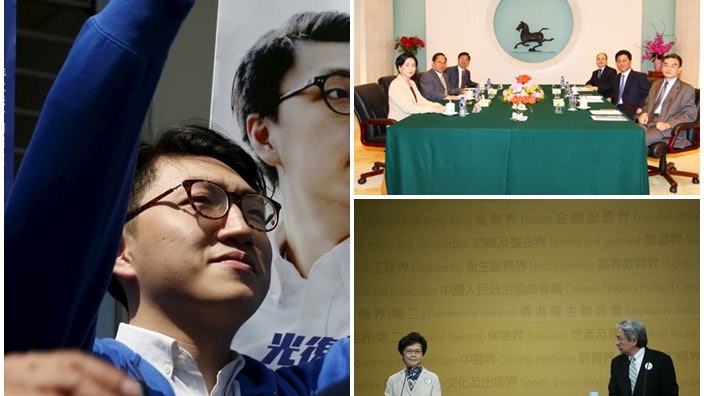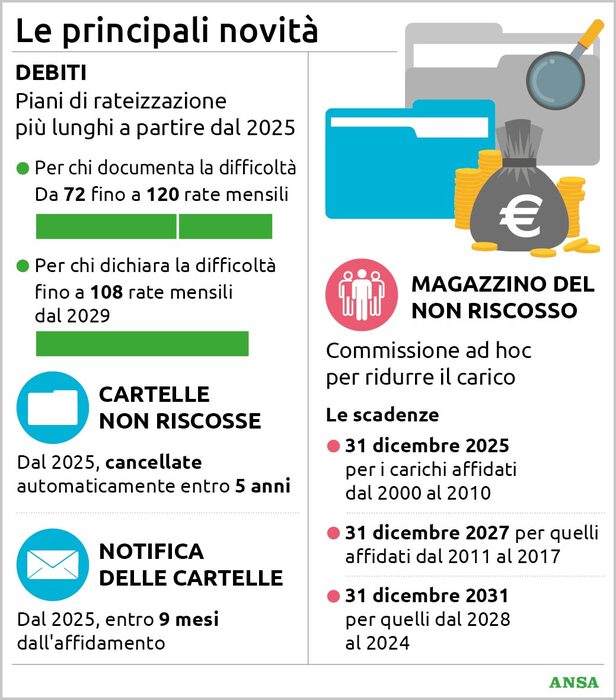Political situation
Written by: Lin Jian
2020-08-20 07:00
Last update date: 2020-08-20 07:00Whether the Legislative Council should remain in office after a year's postponement has recently become the focus of discussion within the democrats. The incumbent members of the democrats have stated that most people tend to stay in the parliament; the protesters continue to launch public opinion offensives, demanding that the pan-democrats boycott the parliament, deny the legitimacy of the extension, and point out that the voter's authorization is only four years, and the dispute has become a war of abuse. A big split seems to be coming again.
In fact, since the emergence of the radicals more than ten years ago, the democrats have been involved in line disputes many times, and differences have always existed. It can even be said that the time of division is more than the time of unity. Reflecting the past and knowing the present, this article will review the five largest splits of the democratic party in recent years. Almost every time, the camp has to spend a very long time repairing the relationship, and even some of the grievances have continued to this day. Among them, a split ten years ago, the trajectory is surprisingly similar to today...
Ma Yue, associate professor of the Department of Politics and Administration of the Chinese University of China, said that this type of division has its historical "inevitability" after the democratic movement has been ineffective for a long time, and it is inevitable. In particular, democrats will pay more attention to principles, democracy, and freedom of speech. Internal differences will be easier to put on the table.
▼In 2010, the five districts' general resignation and political reform disputes▼
+2
Further reading:
[Interview] A ten-year review of the five districts' speeches Liang Guoxiong: The referendum effect could have appeared earlier.
[Interview] A ten-year look back at the social movement, Zhou Cheng laments: Today’s young generation struggles hard
2010: The dispute between the "five districts" and the political reform began to split in the future
In 2009, the radical political party at the time proposed a "disguised referendum on the general resignation of the five districts", saying that they wanted to trigger the by-election through the resignation of a democratic member of each of the five local constituencies of the Legislative Council, and respond to political reform disputes with a single issue, so that the public Publicly expressed support for dual universal suffrage and put public pressure on the government. In September of that year, the Civic Party responded to the joining action. At that time, the Democratic Party was skeptical about the concept of a "referendum." Martin Lee and Szeto Wah, the two veterans of the Democratic Party, had a disagreement. The former believed that the referendum was feasible and the latter opposed it. Eventually the Democratic Party announced in December 2009 that it would not participate in the action.
At the end of January 2010, five democratic legislators Chen Weiye, Liang Jiajie, Chen Shuzhuang, Huang Yumin, and Liang Guoxiong resigned together, and the government held a by-election on May 16. However, under severe criticism from the central government, the establishment and government boycotts, the by-election voter turnout was only 17.1%, and the five returned to Parliament without suspense. On June 17 of the same year, the then Chief Executive Donald Tsang and the spokesperson of the "Five District Referendum" Yu Ruowei openly debated political reform.
As for another major branch of the political reform, the Democratic Party twice entered the Liaison Office to meet and negotiate to promote the "Super District Council" proposal. On June 21, the government revised the original political reform plan and added "District Councils (Second)" to the functional constituencies of district councils, which are elected by voters who do not have the right to vote in other functional constituencies, that is, the current " The number of seats for super district councillors has increased from 800 to 1,200. However, the actions of the Democratic Party were accused by the radicals as "underground transactions" and "secret room negotiations." The latter also criticized the political reform plan for "selling democratic principles." Finally, on June 24 and 25, the amendment to the method for the formation of the Chief Executive and the Legislative Council was approved by the Legislative Council with a two-thirds majority under the approval of the Democratic Party and the ADPL. It is the only political reform passed so far.
This political reform controversy clearly separates the democrats into radical and moderate wings. On the positive side, it expands the overall spectrum of the democrats, but on the other hand, it is also the beginning of competition within the camp. The then Legislative Council Members Huang Yumin and Liang Guoxiong strongly criticized the Democratic Party and said they would part ways with the Democratic Party. Liang Guoxiong once pointed out that Situ Hua's "cancer on the brain" caused controversy. A series of incidents later led the Social People's Company to continue to attack the Democratic Party. However, due to differences in sniping strategies, the Social People's Company split into the People's Power in January 2011 and launched the "Vote Debt Pay" operation in the district council election at the end of the same year.
Looking back at this controversy ten years ago, the core behind it is actually the battle between the lines of "adherence to principles" and "entering the system to strive for democracy and moderate compromise." The trajectory is very similar to that of today's democrats staying in office or boycotting parliament; The slogan of the proposal is also the "general speech", "referendum" and so on.
Since the June 4th Incident, the Stake Association has held a memorial evening every year. The dispute between the mainland and Greater China in 2013 opened the battle for future routes. (Profile picture)
2013: The dispute between the local and the Greater China ordered "June 4th" to be mixed with gunpowder
In 2012, people's livelihood and political conflicts between China and Hong Kong surfaced, and local factions emerged. Since the June 4th Incident, Hong Kong people have been going to Victoria Park to mourn through the storm, but this situation changed in 2013. The original theme of the June 4th party of the Stake that year was "Love the country and the people, the spirit of Hong Kong", which caused a backlash from the locals. Some people suggested that Hong Kong people should not bear the burden of "love China" in commemorating June 4th. In the end, the four characters "Love the country and love the people" were Pumped up. The local faction started another mourning in Tsim Sha Tsui.
This controversy between "local" and "Greater China" reveals the ideological differences between the two factions. In the course of the argument, some smell of gunpowder could not be avoided. For example, Chen Yun, the author of "Hong Kong City State", criticized that Hong Kong people went to Victoria Park every year to weep and weep, just to make up for the guilt of supporting the students in Beijing and finally suppressing the end; The leader of the movement, Wang Dan, recounted that local factions such as Chen Yun "abandon universal values."
2013 was only the beginning of related controversies. After that, almost every June 4th event, related disputes will be raised once again. It did not happen until the June 4th rally was banned for the first time this year.
The "Big Taiwan" dispute during the Umbrella Movement in 2014 triggered the withdrawal of the alliance the following year. (Profile picture)
2014, 2015: Datai and withdrawal, "Zuojiao" and "Ghost"
During the 2014 Umbrella Movement, Admiralty’s "Big Taiwan" led by the ACSF, traditional pan-democrats, and left-wingers was a representative of the Heli non-line, preventing the escalation of the operation or fighting back against the blue silk attackers. There were also left-wingers who came to the scene. It is recommended to give up part of the occupied area. Since the beginning of the movement, some local factions have accused the big stage, the "pickett", and the left-wingers of the "riding" movement, believing that they have no right to abandon the occupied areas captured by the frontline demonstrators. From time to time, people came to the scene and shouted "Be careful Zuo Jiao, beware of dispersing water," and "there is no big platform, only the masses" and other slogans, and tried to "dismantle the big platform"; while the big platform refused to speak on the stage with local factions, and the left wing further accused the local factions of being "ghosts" and "destroying the movement." ". The two factions accumulated serious line differences and even personal grievances.
At that time, the government had no follow-up actions after meeting with representatives of the Federation of Students on October 21. The movement dragged on for a long time, and the people continued to drain. On November 30, the Federation of Students and the Students' Thoughts launched an upgrade operation to surround the Chief Executive’s Office, but the operation failed. Later, Zhou Yongkang, then secretary-general of the Federation of Students, pointed out in an interview that the failure of the operation proved that the radical struggle may not be useful and caused controversy. Later, the local faction accused the student federation of making mistakes in its decision-making, and raised issues such as the student federation’s financial confusion, undemocratic decision-making, and insincere reforms, and launched a withdrawal action. In the end, the University of Hong Kong, PolyU, City University, and HKBU voted to withdraw from the ASF.
Many years later, there are still older generations of pan-democrats who are still worried about this matter. In the book "Meditations Before Sentencing" published by former Democratic Party legislator Li Yongda last year, he said that the withdrawal from the Union was "weird" and suspected to be The CCP sent people to infiltrate what the university student union did, but did not provide evidence.
In the 2016 New Territories East Legislative Council by-election, the dispute between Yang Yueqiao and Liang Tianqi was a "classic" confrontation within the democratic camp. (Profile picture)
2016: No. 6 and No. 7, "New Generation Power" and "Key Seat"
In 2015, Tang Jiahua, a current member of the Executive Council, resigned from his position as a member of the Legislative Council and quit the Civic Party, triggering the New Territories East by-election on February 28, 2016. At that time, the three main competitors were the DAB Zhou Haoding (No. 3 candidate), the Civic Party Yang Yueqiao (No. 7 candidate), and the local democratic frontline Liang Tianqi (No. 6 candidate). Liang Tianqi became popular after the riots in Mong Kok on the night of the first day of the Lunar New Year to the early second morning of the Lunar New Year. He became a representative of the "new local generation" and armed resistance, attracting the support of young voters.
At that time, the mainstream people believed that if Zhou Haoding won, the establishment would have 18 seats in direct regional elections. They could control regional direct elections and the counting of functional constituencies at the same time. They must hold the "key seat", so they spread the word for Yang Yueqiao, even some people. He believes that Liang Tianqi's participation in the election is a "single vote" and a "benefit construction system" and should "give way" to Yang Yueqiao, who has a higher chance of winning. Coupled with the fact that the mainstream pan-people fought forcefully to cut off seats during the Mong Kok riots, the two factions renewed their controversy. The battle between the two in the election forum that day smelled of gunpowder. Liang Tianqi's theory of "no bottom line resistance" and Yang Yueqiao's theory of "dangerous and defensible" symbolized the division of lines between the two factions. In the end, Yang Yueqiao received 160,880 votes, only surpassing Zhou Haoding by a margin of 10,000 votes; Liang Tianqi received 66,524 votes.
On the surface, the dispute between the two factions has come to an end. In fact, there are not many gaps between Liang Tianqi and Yang Yueqiao. However, the supporters of the two factions had already forged various feuds during the by-election, which indirectly caused the two factions to become a fire and water. In the same year, the Legislative Council swore an oath. The Youth New Deal Liang Songheng and You Huizhen became the targets of public opinion. They were subsequently disqualified as members. The mainstream and pan-pop voices of support were sparse. Democrats also criticized in the anti-interpretation parade in November. The local faction, the local faction fell into a long period of low ebb. The supporters of the local faction later also "recited courtesy". In the two legislative council by-elections in 2018, they refused to vote for the pan-democrats, and even preferred to vote for the establishment. It is considered one of the reasons why the Kowloon West Democrats lost both battles. It was not until the anti-revision incident in 2019 that the two factions regained their apparent unity.
In the 2017 Chief Executive election, there were disagreements among the democrats on whether to support the "light blue" former Financial Secretary Tseng Chunhua. (Profile picture)
2017: The Light Blue Dream of "Uncle Potato Chips"
After the DQ incident in 2016, the local factions fell silent for a while, and street demonstrations and democratic movements lost their direction. In the 2017 Chief Executive election, former Financial Secretary Tsang Chunhua and former Chief Secretary Carrie Lam Cheng Yuet-ngor met hand in hand, and a total of three entered the gate with the retired judge Hu Guoxing. At that time, some democrats believed that "Uncle Potato Chips" Tseng Junhua was good at communication, had high public relations skills, and was more moderate in the establishment. Compared with the "extreme left" line of Carrie Lam, he was a "lesser evil" and that being elected would allow society "Retreat and rejuvenate," stepping out of the atmosphere of opposition. At that time, Tseng Junhua was nominated by the election committees of the establishment and the pan-democracy faction at the same time, and there were also members of the democratic party who joined Tseng Junhua's campaign team.
However, there is another voice in the democrats, who thinks that Tseng Junhua is also an establishment and supports the legislation of Article 23 of the Basic Law. Under the political environment at the time, the chief executive was ultimately responsible to the central government, and no one would be elected as a political line. It's too different; the local faction also thinks that Tsang Chunhua has also explicitly attacked Hong Kong independence, which is no different from Lam Cheng. In the end, Zeng Junhua lost to Carrie Lam with 365 votes due to a large proportion of people's popularity. This "light blue dream" lasted only a few months and then shattered.
Compared with the previous four splits, this rift caused not many rifts within the democrats. However, whether or not the democrats are willing to support a light blue person is a contradiction between "principle" and "compromise."
Ma Yue believes that the split of the democrats has its historical "inevitability," and calls on the two factions to find a space between them. (Profile picture)
Ma Yue: Splitting is "inevitable", calling for room for maneuver
A democratic legislator who did not want to be named sighed to the reporter of "Hong Kong 01" that unlike the establishment, which has a unified calibre in the Western District, the overall situation will always override the interests of individuals/partisans. The spectrum of the democrats is very fragmented and there is nothing. The "communist" can unite all factions and convince most people in the spectrum. Sometimes it is inevitable that some parties will put their own interests above the overall situation. I believe this situation is difficult to resolve.
Ma Yue also analyzed to reporters that the split between local democrats has its inevitability behind it, because the democratic movement has been fruitless for a long time, and the suppression is getting stronger and stronger. There will definitely be radicalization of the line, and the radicals will become more and more radical. It is getting easier to attract supporters. In Hong Kong, it has been this trajectory for more than ten years. Ten years ago, the community was a radical faction. Later, the local faction came on the scene, and there were more radical factions such as "brave" and Hong Kong independence. The whole spectrum was widened and conflicts. It's getting easier and easier. During the anti-amendment incident last year, the "unrequited peace and courage" and "brothers climbing the mountain" were an "unbelievable unity", but as soon as the election came, there were only so many seats, and there were too many seats. Even outside the system, they dominated. There is only one route. Under conflicts of interest, it is easier to divide.
Regarding the current situation of the democrats, Ma Yue suggested that each faction should explore more different possibilities and find the possibility of falling in the middle. Don't fall into principled discussions at the beginning, and easily elevate to the level of "all or nothing", otherwise there will be never Way out. He pointed out that both sides can state their respective pros and cons, their plan of action for staying or leaving in the next year, and even further seeking solutions for collaboration within and outside the parliament to achieve another "brother climbing" effect.
However, Ma Yue said that the establishment will also have internal differences, but it is not so easy to put it on the table. He pointed out that people who support democracy are generally more principled and philosophical, emphasizing democracy, freedom of speech, and equality. "Any different opinions can be said. There is no need to be afraid of the "big boss culture." Then the differences are of course easy to be seen."
Dismantling the Council | The Legislative Council Goes to Remain in the Dispute of Intent
Interview|The game behind the deconstruction of the "Zong Ci" initiative Yuan Michang: internal seizure of power is real
Extension of Legislative Council Office | Liu Ying Kuang mentions "Shadow Warrior" on Li Guolin questioning the feasibility
Legislative Council Democrats


/cloudfront-eu-central-1.images.arcpublishing.com/prisa/OTWB63YVDRNKAQLEH7S4FTFBNI.jpg)











